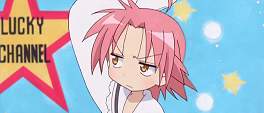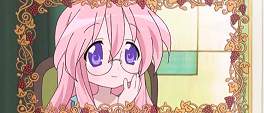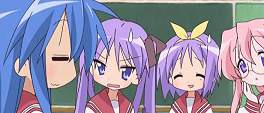It's hard to describe Lucky Star without using words such as "meta" or "proto", or comparing it to similar all-female high-school comedies such as Azumanga Daioh or School Rumble or perhaps drifting into expletives about the circular Suzumiya Haruhi references by Kyoto Animation. The concept to take away from Lucky Star is that it is relevant to compare it to all of these things, and brutally unfair.
Lucky Star shines because it manages to not so much parody but lampoon modern otaku and anime by, paradoxically, being a fan pandering anime itself. The first episode was divisive in that many wrote off the long soliloquies as boring or blatantly obvious as to their purpose, this weaned off the Haruhi refugees like a brick wall. In retrospect the meandering script changed little in delivery or tone from the last episode to the first episode, unlike the aesthetics which, while universally well animated, showed how much the animators settled in to drawing the characters. The first episode did brilliantly in laying down the foundation of the rest of the series, characters were expanded upon and new ones introduced, but the humour and pacing remained.
The humour is obviously the "point" of Lucky Star and thankfully a wide gamut of tastes are catered for. Mentioning Azumanga and School Rumble is useful in that it demonstrates the range that Lucky Star has, the late series Azumanga bizarreness has nitrous added to it for the Lucky Channel segment while the day-to-day existence of School Rumble, sans the frequent daydreams, is the meat of the show. Lucky Star goes further and ladles on copious anime culture references and finishes off with some "I can relate to that!" examinations of life.
Obviously with comedy at the forefront, the touching and sincere moments are all the more pronounced and perhaps take on greater weight because of it. Kagami's private quest for a boyfriend is really as close as the series gets to drama, while the appearance of Konata's late mother is as far as it diverges from reality.
The real crunch for the series is some of the self-imposed dead-zones. Some of the jocularity can fall flat as quickly as it can flow over a foreigner's head and select episodes can spiral terminally downwards. Those who also only follow the show and have yet to expose themselves to the plethora of extras (radio dramas and the like) can sometimes feel like they're coming in half-way through a joke, most noticeably with the categorically surreal Lucky Channel. These are the exception to what is an otherwise consistent and sometimes raucous series; fundamentally Lucky Star is a victim of its parent's success.
The critical-mass that the first series of Haruhi reached is obviously going to reflect on any realistic portrayal of modern anime fans, in this case Konata. The problem with showing the Haruhi juggernaut is of course that the same studio responsible for it does Lucky Star, Kyoto Animation, and the result is worthy of cringes and comes across as incestuous rather than referential. This feeling is not helped by the bleeding of anime and reality with such cross-overs as the Newtype letter Konata apparently writes, "Konata is my wife" or the frequent covers of real-world publications scattered throughout the show.
One could also level criticism at its treatment of some characters such as the oft besmirched Tsukasa or the supposedly underutilised Miyuki, even some of the late-to-the-party characters seem ignored compared to the tried and tested Kagami x Konata tiffs. These are all valid criticisms were this a show where development revealed something further about the character; however the near-voyeuristic nature of the series means what you see is what you get, there are no dark secrets awaiting exposure.
These are niggling points in what is a hilarious series with no qualms about who it's aimed for and well deserving of its popularity, with or without riding on the coat-tails of previous KyoAni successes.











